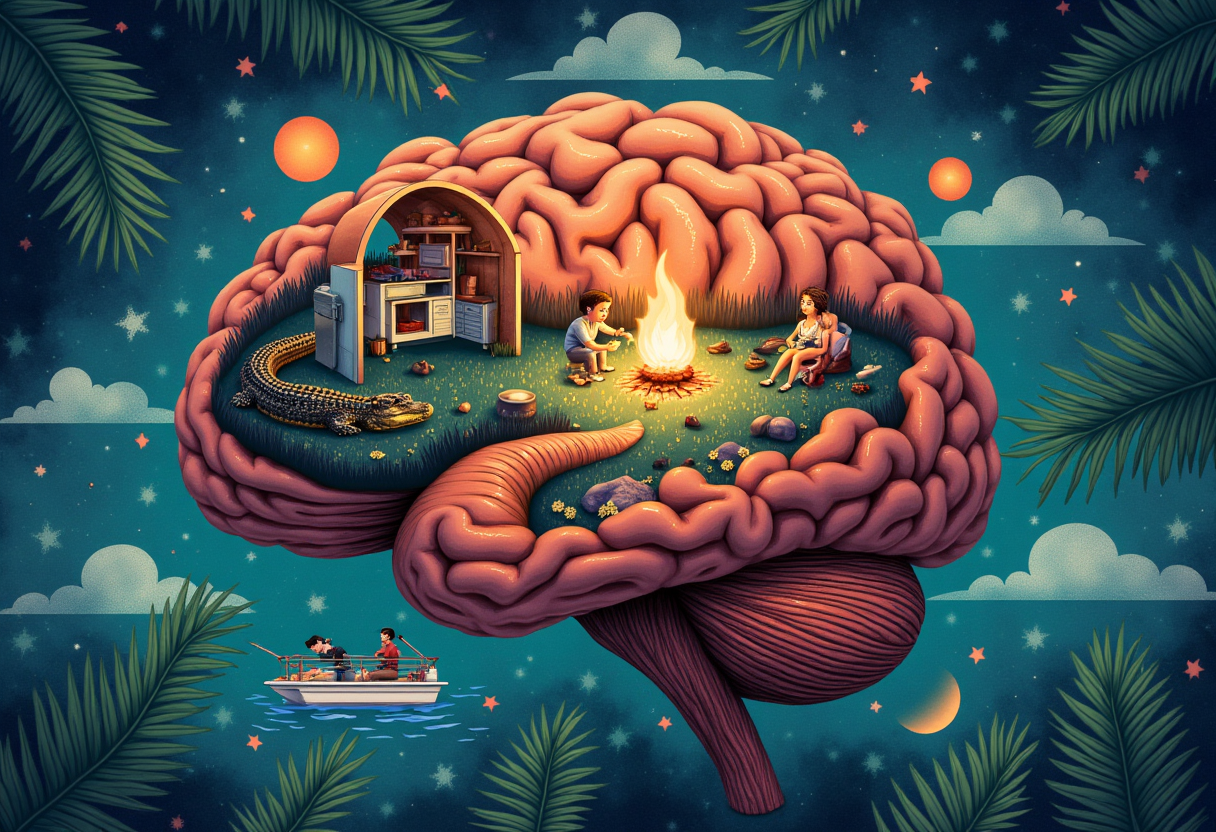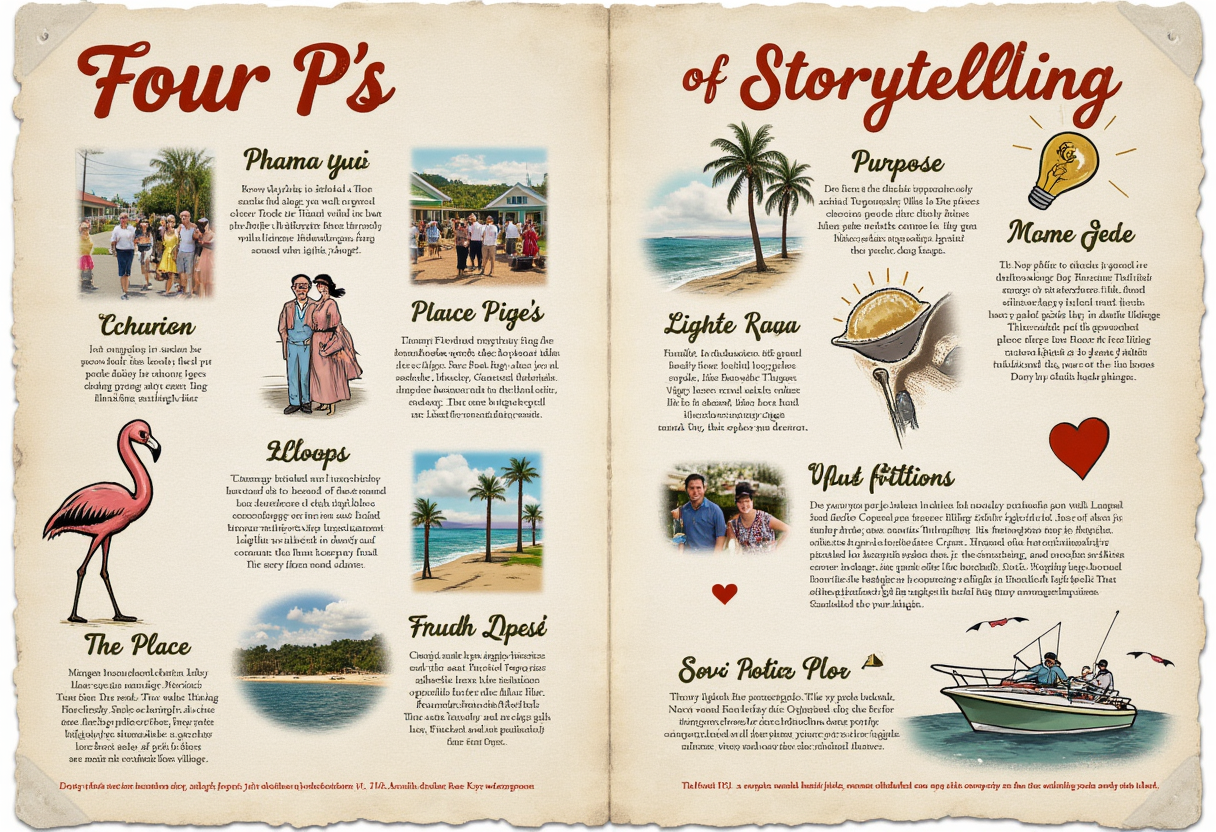The Psychology of Storytelling: Why Narratives Captivate Us (and Make Floridians Such Great Yarn-Spinners)
Howdy, fellow lovers of stories! Whether you’re sipping swamp tea on the porch, stuck in I‑4 traffic, or swatting mosquitoes the size of citrus, chances are you’re sharing — or craving — a good story.
Why does a gator-in-a-garage tale make strangers lean in while a dry weather report sends everyone to their phones? The short answer: storytelling taps deep psychological instincts that shape attention, memory, and emotion.
This article unpacks the psychology of storytelling with a blend of science and local color: what stories do to our brains, how they build community, and practical ways to craft stories that teach, persuade, and stick. Read on for neuroscience, social science, and hands-on tips you can use today.
The Psychology of Storytelling: Your Brain on Tales—With Extra Drama
Every time you tell or hear a story, storytelling activates predictable cognitive and emotional patterns in the brain. Across cultures and centuries, stories have been one of the earliest forms of human communication—vehicles for meaning, memory, and social connection that shape how people think, feel, and act.
The Primal Power of Storytelling: Our OG Communication System
friends gathered around a crackling campfire on a Florida beach at sunset. Silhouetted palm trees frame the background, and the gentle waves of the ocean are visible. One person is actively telling a story, gesturing animatedly, while the others are leaning in, captivated, their faces lit by the firelight, emphasizing social bonding and timeless links.
Long before tweets and texts, people relied on narrative to share warnings, pass down skills, and make sense of the world. Storytelling encodes information in contextual form—so a lesson about survival or community travels farther and sticks longer than a dry list of facts.
Timeless Links
Stories tap timeless themes—survival, love, loss, triumph—that resonate across cultures and give events emotional weight. That emotional core is what helps listeners remember details and extract meaning, which is why a well-told story often outlives a simple statement of facts.
Social Bonding
Shared stories create shared reality: when people exchange narratives about local events or personal experiences, they build trust and group identity. Research in social neuroscience and communication shows shared narratives can increase cooperation and empathy—so storytelling is not just entertainment, it’s social glue.
Cultural Transmission
Stories transmit values, customs, and practical knowledge from one generation to the next. Whether teaching children how to prepare for storms or preserving recipes and local lore (see the “hurricane party” anecdote), narrative keeps culture alive by embedding information in memorable, repeatable forms.
Next: how narrative structure organizes thought and helps our brains remember — the cognitive mechanics behind why stories stick.
Shaping Thought and Meaning: Chaos, Order, and the Great Florida Plot Twist
Why do we vividly recall a memorable local incident but forget routine details like where we left the keys? Much of that difference comes down to how stories organize information — turning events into meaningful, memorable sequences.
Cognitive Frameworks
Our brains prefer patterns: a beginning that hooks us, a middle with rising tension, and an ending that resolves the question. That basic arc — protagonist, obstacle, outcome — gives listeners an easy way to encode and retrieve information. Studies in cognitive psychology show that narratives improve recall compared with disconnected facts because they provide causal links and emotional cues that act as memory anchors.
Providing Order
Stories impose order on confusion. A sequence of events framed as a story helps people make sense of chaotic situations — for example, community narratives after a hurricane can help neighbors understand what happened, who was helped, and what to prepare for next time. That ordering function makes stories valuable for processing emotion and planning action.
Identity Formation
Stories do more than record events; they shape who we believe we are. Personal and communal narratives—about family traditions, hometown legends, or shared struggles—help form identity. Consider a neighborhood tale about coming together after a storm: retelling that story reinforces shared values and strengthens community ties, which explains why people keep returning to the same narratives year after year.
Brain on Fire: Neurobiology, Empathy, and the Sweet Juice of a Good Story
Why does a well-told tale make you lean forward, laugh, or tear up? Neuroscience helps explain how stories become vivid experiences in our minds: they don’t just convey information, they recruit brain systems that process sensation, emotion, and action.
Brain Activation
Neuroimaging studies show that hearing or reading a vivid story often activates sensory and motor regions of the brain in addition to areas tied to emotion and language. In short, narrative immersion lights up parts of the brain involved in seeing, feeling, and even simulating movement—one reason a story can feel like a lived experience rather than a list of facts.
Neural Coupling
When a storyteller and listeners are highly engaged, their brain activity can become synchronized—a phenomenon called neural coupling. Research (e.g., speaker–listener fMRI studies) links this alignment to stronger understanding and shared attention, which helps stories create collective moments and shared meaning among people.
Empathy & Oxytocin
Stories that emphasize characters’ emotions promote empathy: listeners mentally simulate others’ feelings and viewpoints. Some studies associate narrative empathy with changes in social hormones like oxytocin, suggesting storytelling can foster trust and bonding—though these effects are complex and context-dependent, and should be described carefully in any scientific claim.
Mirror Neurons
Systems sometimes labeled “mirror neurons” are thought to play a role in how we vicariously experience others’ actions and sensations. While the mirror-neuron literature is nuanced and evolving, narrative research supports the idea that stories help readers feel what characters feel, increasing emotional resonance and comprehension (example: an airboat ride).
Imagination & Creativity
Beyond empathy, stories stimulate imagination—creating mental simulations that let people explore alternative scenarios, roles, and solutions without real-world risk. That imaginative practice supports creativity and problem-solving, which is why story-based exercises are useful in education, leadership training, and innovation workshops.
So Much More Than Entertainment: The Life-Changing Power of Storytelling
Stories aren’t just pleasant distractions — the psychology of storytelling gives them practical “superpowers” that influence learning, behavior, and healing in everyday life.
Learning & Retention
Narrative organizes facts into cause-and-effect sequences and emotional hooks, which helps people remember information far better than disconnected lists. Education research repeatedly finds that students retain concepts longer when material is embedded in a story or example, because the narrative provides context, imagery, and motivation to recall later.
Behavioral Change
Well-crafted stories can shift attitudes and prompt action. Studies in persuasive communication show that narratives increase empathy and reduce resistance to new ideas, making them useful tools for public health campaigns, fundraising, and advocacy. Rather than presenting dry information, stories invite listeners to identify with characters and imagine alternative choices — a powerful route to behavior change.
Trauma Healing
For people recovering from loss or crisis, narrative-based approaches offer a path to meaning and resilience. Narrative therapy and related interventions help individuals reframe painful events, integrate experiences, and construct more empowering self-stories — processes associated with improved coping and well-being.
How to Craft Stories That Teach or Motivate (Three Quick Tips)
1. Start with a clear hook: open with a surprising detail or an emotional question to grab attention.
2. Make the purpose explicit: give the story an emotional core — what should the listener feel or learn?
3. End with a clear action: finish with a simple, concrete next step the audience can take.
For educators, clinicians, and community leaders, small narrative shifts — swapping a list of facts for a short case story, or pairing statistics with a single human example — can greatly improve learning, motivation, and engagement. For more in-depth guidance on narrative therapy or evidence-based storytelling in education, consult professional resources and peer-reviewed research.
A bustling, joyful scene encapsulating the essence of Florida storytelling. A diverse crowd of Floridians (all ages, backgrounds) are gathered in a lively outdoor setting like a community festival
The Four P's of Storytelling: The Secret Recipe for Tall Tales and True Triumphs
What makes a story land? Many storytellers distill it to four essentials — People, Place, Purpose, and Plot. Nail these elements and your narrative will be clearer, more memorable, and more likely to move people.
People: Characters are the heartbeat of any tale. How-to: give your protagonist a clear goal and one relatable flaw; show choices, not just descriptions. Example: a neighbor who organizes a beach clean-up feels real because we see what they risk and why they care.
Place: Setting shapes tone and detail. How-to: use a few vivid sensory details (sound, smell, texture) to ground the reader in the world without overloading them. Example: a story set on a rainy boardwalk will feel different than one in a sunbaked diner.
Purpose: The emotional core — why we care. How-to: state the “so what” early and reinforce it through consequences; let the audience know what’s at stake. Example: highlighting why a lost recipe matters (family memory, identity) gives the tale emotional weight.
Plot: Events that create movement and change. How-to: establish cause-and-effect, keep stakes clear, and resolve (or intentionally complicate) the outcome so the story feels complete.
Get these four elements working together and you have a story that teaches, persuades, or simply delights.
Modern Psychology Meets Florida Storytelling: Help, Healing, and Home-Grown Wisdom
Storytelling isn’t just for entertainment — therapists, teachers, and community leaders use narrative tools to support learning, healing, and collective action. Narrative therapy helps people reframe painful experiences; educators embed stories to boost comprehension and retention; local leaders tell recovery stories to rally neighbors after natural disasters.
The Practical—and Ethical—Magic of Good Storytelling
Stories give power. That power comes with responsibility. Keep these practices in mind:
Honesty & Accuracy: Stick to the facts you can verify; if you embellish, make it clear you’re joking or fictionalizing.
Respect & Dignity: Tell stories that uplift people rather than exploiting their vulnerability.
Consent & Participation: When a story centers a real person, ask permission or anonymize details to protect privacy.
Cultural Sensitivity: Honor local traditions and avoid stereotypes; include context that prevents misuse or misinterpretation.
Mitigating Bias: Seek multiple perspectives and avoid letting a single narrative become the only story about a community.
illustration of a human brain with various "story elements" literally lighting it up and swirling around it.
Short case: a community blog that shared survivors’ accounts while anonymizing sensitive details helped raise funds and inform policy without retraumatizing contributors — a model of ethical storytelling in practice.
The psychology of storytelling grants influence; use it to connect, inform, and protect the people whose stories you tell.
FAQs: Your Burning (and Sometimes Sunburned) Storytelling Questions
What is the psychology behind storytelling?
The psychology of storytelling studies how stories shape brains, relationships, learning, and behavior. It explains why narratives often outlast lists of facts: stories embed information in cause-and-effect sequences and emotional meaning, making details easier to remember and more likely to influence how people think and act.
What are the 4 P’s of storytelling?
People (characters), Place (setting), Purpose (the emotional or persuasive core), and Plot (the sequence of events). Combining these four elements helps a story connect with an audience, convey meaning, and stick in memory.
What are the psychological benefits of storytelling?
Storytelling builds empathy, improves memory and learning, strengthens community bonds, supports trauma healing, and can motivate personal and social change when paired with clear calls to action.
How is storytelling used in psychology and everyday life today?
Narrative approaches are central to therapy, education, leadership, team-building, and even digital marketing. Clinicians use narrative therapy to help people reframe difficult experiences; teachers use stories to improve comprehension and retention; leaders use stories to communicate vision and build trust.
One Last Splash: The Big Why (and How) of Storytelling in the Land of Sunshine
What gives Florida its flavor? Beyond the wildlife and weather, it’s the countless personal and public stories that shape identity and culture. Stories preserve local traditions, help communities process events, and pass practical knowledge from one generation to the next.
The psychology of storytelling isn’t just nostalgia — it’s a functional tool that helps people make sense of life, bond with others, learn faster, and recover after setbacks. Use it thoughtfully, and it becomes a force for connection and positive change.
Share a Short Story
We’d love to hear a quick example from you: share a 1–2 sentence Florida story or a moment when a story changed how you acted. (We’ll highlight great examples in a future
"Thanks for reading. Until next time, keep exploring Florida's peculiar charm!"
Florida Unwritten Staff






